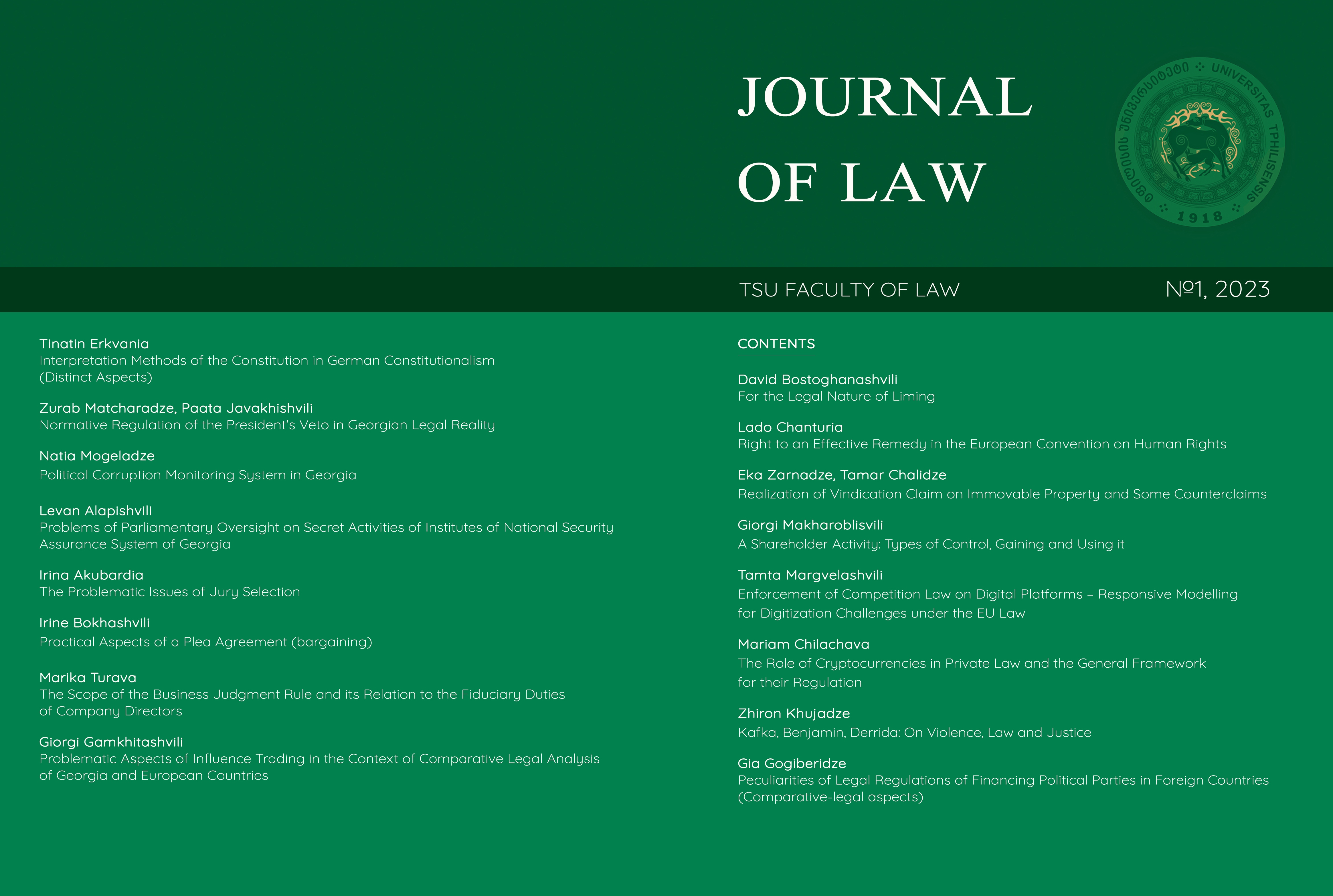Kafka, Benjamin, Derrida: On Violence, Law and Justice
DOI:
https://doi.org/10.60131/jlaw.1.2023.7065Keywords:
Kafka, Benjamin, Derrida, before the law, teaching, violence, law, justice, deconstruction.Abstract
Kafka’s parable “Before the Law” tells us about the countryman who spends his whole life in front of the law’s gate and aims futilely to gain access to it. This article is devoted to the main question expressed as follows: why can’t the man attain his aim? Wording the question is already an interpretation which in Kafka’s world is not completed by “solving”. And philosophers of “irresoluble” are Walter Benjamin and Jacques Derrida. They read Kafka (his literature and his personality) and help the man from the country, which requires analysing the connections and relations between the law (das Gesetz, la loi) and violence, law (das Recht, le droit) and religious teachings, the law and its origins, law and justice.
References
Adorno T.W., Notes on Kafka, Prisms, Weber S., Weber S. (trans.), Cambridge, 1983, 246.
Agamben G., Homo Sacer: Sovereign Power and Bare Life, Heller-Roazen D. (trans.), Stanford, 1998, 50, 53, 55.
Agamben G., K, The Work of Giorgio Agamben: Law, Literature, Life, Heron N. (trans.), Clemens J., Heron N., Murray A. (eds.), Edinburgh, 2011, 13-14.
Agamben G., On the Limits of Violence, Fay E. (trans.), Diacritics, Vol. 39, № 4, 2009, 107.
Arendt H., On Violence, San Diego, New York, London, 1970, 4.
Benjamin W., Critique of Violence, Selected Writings, Vol. 1, 1913-1926, Jephcott E. (trans.), Bullock M., Jennings M.W. (eds.), Cambridge, London, 1996, 239, 242-243, 244-245, 250, 251-252.
Benjamin W., Franz Kafka: On the Tenth Anniversary of his Death, Illuminations: Essays and Reflections, Zohn H. (trans.), Arendt H. (ed.), New York, 1969, 114, 122.
Benjamin W., On Language as Such and on the Language of Man, Selected Writings, Vol. 1, 1913-1926, Jephcott E. (trans.), Bullock M., Jennings M.W. (eds.), Cambridge, London, 1996, 64-71.
Benjamin W., Some Reflections on Kafka, Illuminations: Essays and Reflections, Zohn H. (trans.), Arendt H. (ed.), New York, 1969, 143, 144.
Benjamin W., The Storyteller: Reflections on the Works of Nikolai Leskov, The Novel: An Anthology of Criticism and Theory 1900-2000, Hale D.J. (ed.), Malden, 2006, 364.
Benjamin W., The Task of the Translator, Illuminations: Essays and Reflections, Zohn H. (trans.), Arendt H. (ed.), New York, 1969, 69-70.
Born J., Kafka’s Parable “Before the Law”: Reflections towards a Positive Interpretation, Mosaic: An Interdisciplinary Critical Journal, Vol. 3, № 4, 1970, 153-154.
Derrida J., Force of Law: The “Mystical Foundation of Authority”, Deconstruction and the Possibility of Justice, Quaintance M. (trans.), Carlson D.G., Conell D., Rosenfeld M. (eds.), New York, London, 1992, 52, 62.
Kafka F., Before the Law, Wedding Preparations in the Country and Other Stories, Muir W., Muir E. (trans.), New York, 1978, 127-128.
Kafka F., Dearest Father, Stokes H., Stokes R. (trans.), Great Britain, 2008, 77.
Litowitz D.E., Franz Kafka’s Outsider Jurisprudence, Law & Social Inquiry, Vol. 27, № 1, 2002, 104.
Nietzsche F., Thus Spoke Zarathustra, Del Caro A. (trans.), Del Caro A., Pippin R.B. (eds.), Cambridge, 2006, 156.
Schonfeld E., Am-ha’aretz: The Law of the Singular. Kafka’s Hidden Knowledge, Kafka and the Universal, Cools A., Liska V. (eds.), Berlin/Boston, 2016, 109-112, 114-119, 119-128.
Teubner G., Legal Irritants: Good Faith in British Law or How Unifying Law Ends up in New Divergences, The Modern Law Review, Vol. 61, № 1 1998, 31-32.
Downloads
Published
How to Cite
Issue
Section
License

This work is licensed under a Creative Commons Attribution-ShareAlike 4.0 International License.









